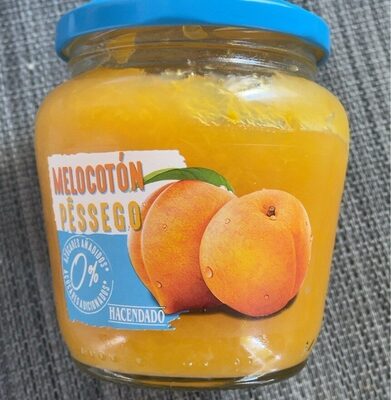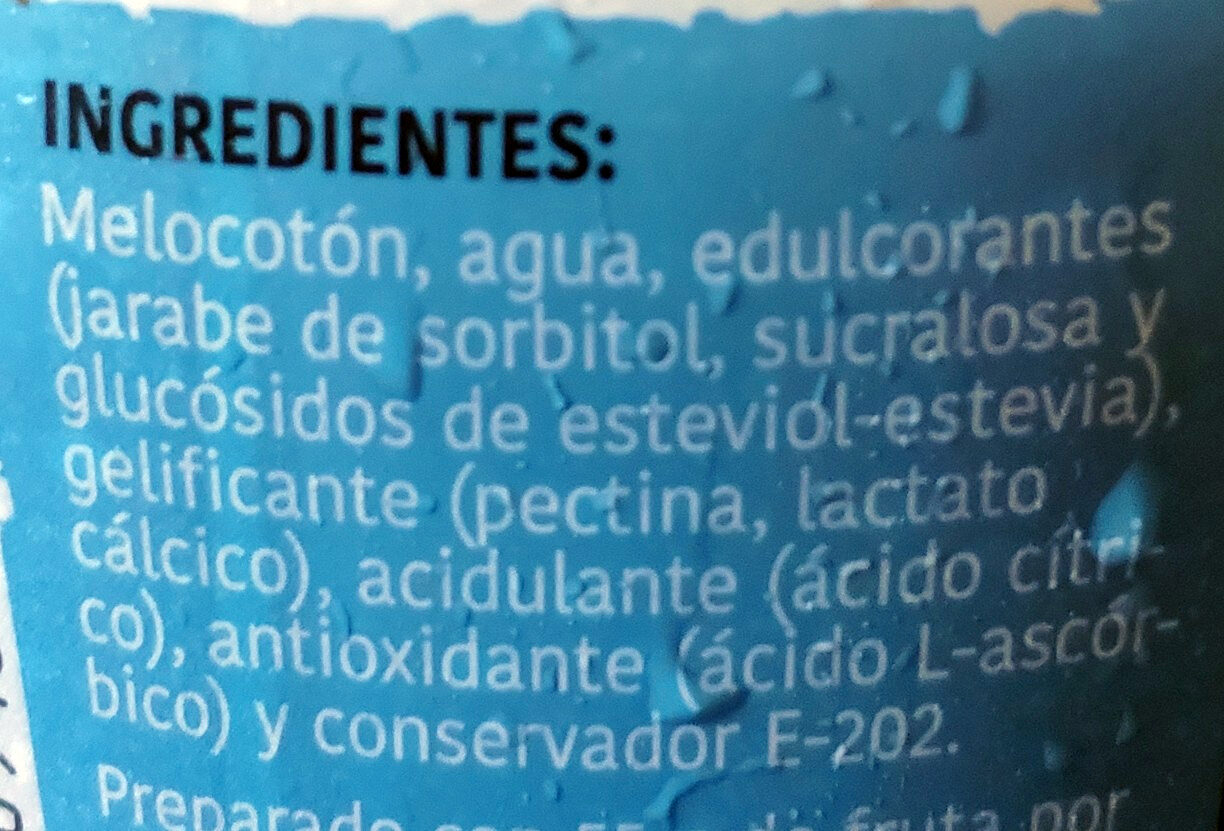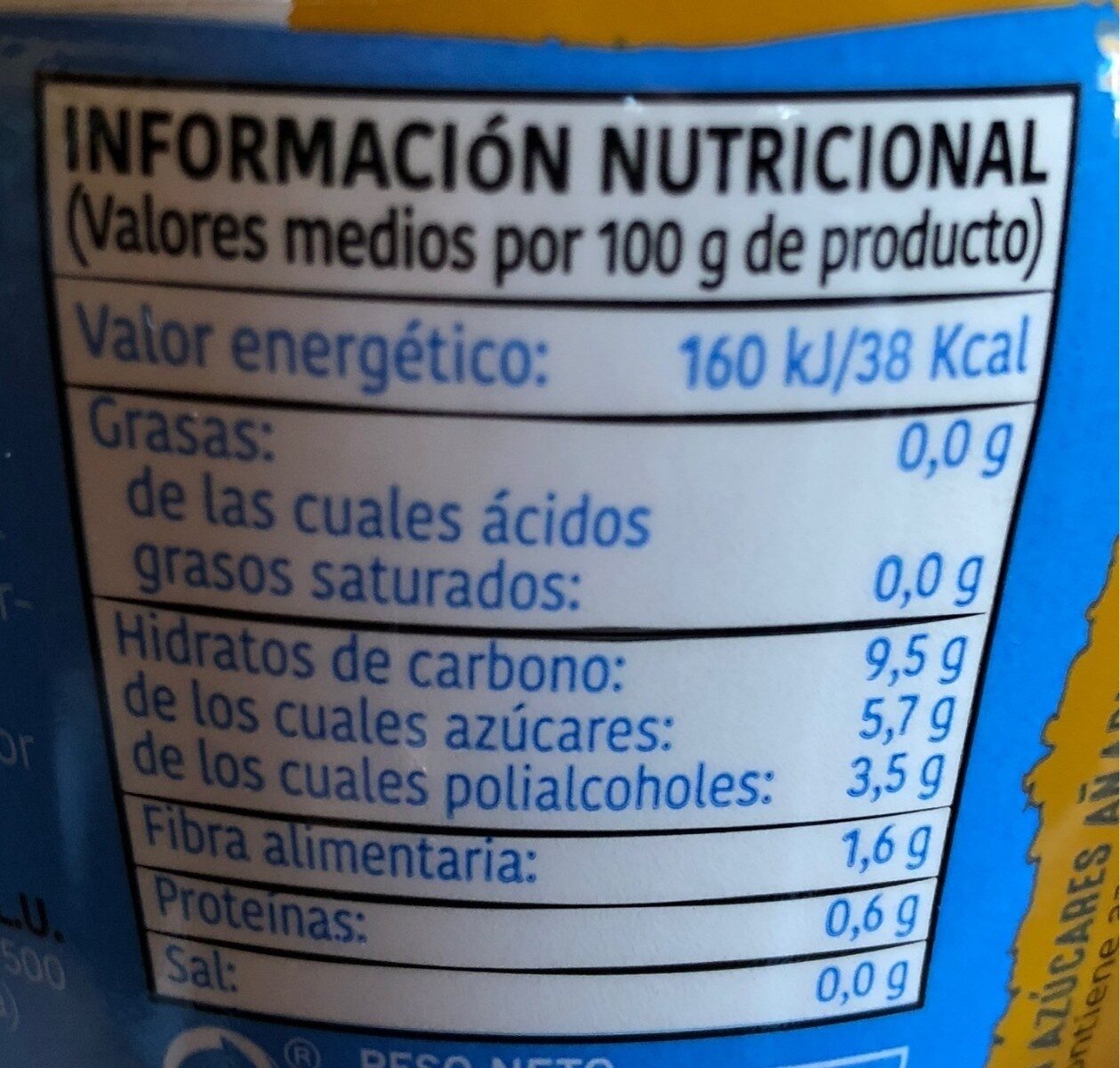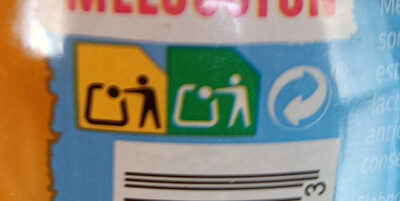Help us make food transparency the norm!
As a non-profit organization, we depend on your donations to continue informing consumers around the world about what they eat.
The food revolution starts with you!
Mermelada De Melocotón 0% Azúcares Añadidos Extra - Hacendado - 380 g
Mermelada De Melocotón 0% Azúcares Añadidos Extra - Hacendado - 380 g
This product page is not complete. You can help to complete it by editing it and adding more data from the photos we have, or by taking more photos using the app for Android or iPhone/iPad. Thank you!
×
Barra-kodea: 8480000150943 (EAN / EAN-13)
Izen arrunta: Mermelada de melocotón 0% azúcares añadidos
Kopurua: 380 g
Ontziratzea: en:Glass, en:Jar, es:Green dot
Markak: Hacendado
Kategoriak: en:Plant-based foods and beverages, en:Plant-based foods, en:Fruits and vegetables based foods, en:Breakfasts, en:Spreads, en:Fruits based foods, en:Plant-based spreads, en:Sweet spreads, en:Fruit and vegetable preserves, en:Jams, en:Marmalades, en:Peach jams
Etiketak, ziurtagiriak, sariak:
en:No gluten, en:No preservatives, en:Green Dot, No added sugar, en:No colorings, en:With sweeteners
Manufacturing or processing places: Murcia, España
Traceability code: ES 21.00318/MU CE
Saltzen diren herrialdeak: Espainia
Matching with your preferences
Health
Osagaiak
-
15 ingredients
: Melocotón, agua, edulcorantes (jarabe de sorbitol, sucralosa, glucósidos de esteviol-estevia), gelificante (pectina, lactato cálcico), acidulante (ácido cítrico), antioxidante (ácido L-ascórbico), conservador (E202).
Food processing
-
Ultra processed foods
Elements that indicate the product is in the 4 - Ultra prozesatutako elikagaiak eta edariak group:
- Gehigarria: E327
- Gehigarria: E420
- Gehigarria: E440 - Pektina
- Gehigarria: E955
- Gehigarria: E960
- Osagaia: Gelling agent
- Osagaia: Sweetener
Food products are classified into 4 groups according to their degree of processing:
- Prozesatu gabeko edo ahalik eta gutxien prozesatutako elikagaiak
- Sukaldaritzako osagaiak prozesatu
- Prozesatutako jakiak
- Ultra processed foods
The determination of the group is based on the category of the product and on the ingredients it contains.
Gehigarriak
-
E202
Potassium sorbate: Potassium sorbate is the potassium salt of sorbic acid, chemical formula CH3CH=CH−CH=CH−CO2K. It is a white salt that is very soluble in water -58.2% at 20 °C-. It is primarily used as a food preservative -E number 202-. Potassium sorbate is effective in a variety of applications including food, wine, and personal-care products. While sorbic acid is naturally occurring in some berries, virtually all of the world's production of sorbic acid, from which potassium sorbate is derived, is manufactured synthetically.Source: Wikipedia (Ingeles)
-
E327
Calcium lactate: Calcium lactate is a white crystalline salt with formula C6H10CaO6, consisting of two lactate anions H3C-CHOH-CO−2 for each calcium cation Ca2+. It forms several hydrates, the most common being the pentahydrate C6H10CaO6·5H2O. Calcium lactate is used in medicine, mainly to treat calcium deficiencies; and as a food additive with E number of E327. Some cheese crystals consist of calcium lactate.Source: Wikipedia (Ingeles)
-
E330 - Azido zitriko
Citric acid: Citric acid is a weak organic acid that has the chemical formula C6H8O7. It occurs naturally in citrus fruits. In biochemistry, it is an intermediate in the citric acid cycle, which occurs in the metabolism of all aerobic organisms. More than a million tons of citric acid are manufactured every year. It is used widely as an acidifier, as a flavoring and chelating agent.A citrate is a derivative of citric acid; that is, the salts, esters, and the polyatomic anion found in solution. An example of the former, a salt is trisodium citrate; an ester is triethyl citrate. When part of a salt, the formula of the citrate ion is written as C6H5O3−7 or C3H5O-COO-3−3.Source: Wikipedia (Ingeles)
-
E420
Sorbitol: Sorbitol --, less commonly known as glucitol --, is a sugar alcohol with a sweet taste which the human body metabolizes slowly. It can be obtained by reduction of glucose, which changes the aldehyde group to a hydroxyl group. Most sorbitol is made from corn syrup, but it is also found in nature, for example in apples, pears, peaches, and prunes. It is converted to fructose by sorbitol-6-phosphate 2-dehydrogenase. Sorbitol is an isomer of mannitol, another sugar alcohol; the two differ only in the orientation of the hydroxyl group on carbon 2. While similar, the two sugar alcohols have very different sources in nature, melting points, and uses.Source: Wikipedia (Ingeles)
-
E420ii
Sorbitol: Sorbitol --, less commonly known as glucitol --, is a sugar alcohol with a sweet taste which the human body metabolizes slowly. It can be obtained by reduction of glucose, which changes the aldehyde group to a hydroxyl group. Most sorbitol is made from corn syrup, but it is also found in nature, for example in apples, pears, peaches, and prunes. It is converted to fructose by sorbitol-6-phosphate 2-dehydrogenase. Sorbitol is an isomer of mannitol, another sugar alcohol; the two differ only in the orientation of the hydroxyl group on carbon 2. While similar, the two sugar alcohols have very different sources in nature, melting points, and uses.Source: Wikipedia (Ingeles)
-
E440 - Pektina
Pectin: Pectin -from Ancient Greek: πηκτικός pēktikós, "congealed, curdled"- is a structural heteropolysaccharide contained in the primary cell walls of terrestrial plants. It was first isolated and described in 1825 by Henri Braconnot. It is produced commercially as a white to light brown powder, mainly extracted from citrus fruits, and is used in food as a gelling agent, particularly in jams and jellies. It is also used in dessert fillings, medicines, sweets, as a stabilizer in fruit juices and milk drinks, and as a source of dietary fiber.Source: Wikipedia (Ingeles)
-
E955
Sucralose: Sucralose is an artificial sweetener and sugar substitute. The majority of ingested sucralose is not broken down by the body, so it is noncaloric. In the European Union, it is also known under the E number E955. It is produced by chlorination of sucrose. Sucralose is about 320 to 1‚000 times sweeter than sucrose, three times as sweet as both aspartame and acesulfame potassium, and twice as sweet as sodium saccharin. Evidence of benefit is lacking for long-term weight loss with some data supporting weight gain and heart disease risks.It is stable under heat and over a broad range of pH conditions. Therefore, it can be used in baking or in products that require a long shelf life. The commercial success of sucralose-based products stems from its favorable comparison to other low-calorie sweeteners in terms of taste, stability, and safety. Common brand names of sucralose-based sweeteners are Splenda, Zerocal, Sukrana, SucraPlus, Candys, Cukren, and Nevella. Canderel Yellow also contains sucralose, but the original Canderel and Green Canderel do not.Source: Wikipedia (Ingeles)
-
E960
Steviol glycoside: Steviol glycosides are the chemical compounds responsible for the sweet taste of the leaves of the South American plant Stevia rebaudiana -Asteraceae- and the main ingredients -or precursors- of many sweeteners marketed under the generic name stevia and several trade names. They also occur in the related species Stevia phlebophylla -but in no other species of Stevia- and in the plant Rubus chingii -Rosaceae-.Steviol glycosides from Stevia rebaudiana have been reported to be between 30 and 320 times sweeter than sucrose, although there is some disagreement in the technical literature about these numbers. They are heat-stable, pH-stable, and do not ferment. Additionally, they do not induce a glycemic response when ingested, because humans can not metabolize stevia. This makes them attractive as natural sugar substitutes for diabetics and other people on carbohydrate-controlled diets. Steviol glycosides stimulate the insulin secretion through potentiation of the β-cell, preventing high blood glucose after a meal. The acceptable daily intake -ADI- for steviol glycosides, expressed as steviol equivalents, has been established to be 4 mg/kg body weight/day, and is based on no observed effects of a 100 fold higher dose in a rat study.Source: Wikipedia (Ingeles)
Ingredients analysis
-
en:Palm oil free
No ingredients containing palm oil detected
Unrecognized ingredients: es:glucosidos-de-esteviol-esteviaSome ingredients could not be recognized.
We need your help!
You can help us recognize more ingredients and better analyze the list of ingredients for this product and others:
- Edit this product page to correct spelling mistakes in the ingredients list, and/or to remove ingredients in other languages and sentences that are not related to the ingredients.
- Add new entries, synonyms or translations to our multilingual lists of ingredients, ingredient processing methods, and labels.
If you would like to help, join the #ingredients channel on our Slack discussion space and/or learn about ingredients analysis on our wiki. Thank you!
-
en:Vegan status unknown
Unrecognized ingredients: es:glucosidos-de-esteviol-esteviaSome ingredients could not be recognized.
We need your help!
You can help us recognize more ingredients and better analyze the list of ingredients for this product and others:
- Edit this product page to correct spelling mistakes in the ingredients list, and/or to remove ingredients in other languages and sentences that are not related to the ingredients.
- Add new entries, synonyms or translations to our multilingual lists of ingredients, ingredient processing methods, and labels.
If you would like to help, join the #ingredients channel on our Slack discussion space and/or learn about ingredients analysis on our wiki. Thank you!
-
en:Vegetarian status unknown
Unrecognized ingredients: es:glucosidos-de-esteviol-esteviaSome ingredients could not be recognized.
We need your help!
You can help us recognize more ingredients and better analyze the list of ingredients for this product and others:
- Edit this product page to correct spelling mistakes in the ingredients list, and/or to remove ingredients in other languages and sentences that are not related to the ingredients.
- Add new entries, synonyms or translations to our multilingual lists of ingredients, ingredient processing methods, and labels.
If you would like to help, join the #ingredients channel on our Slack discussion space and/or learn about ingredients analysis on our wiki. Thank you!
-
Details of the analysis of the ingredients
We need your help!
Some ingredients could not be recognized.
We need your help!
You can help us recognize more ingredients and better analyze the list of ingredients for this product and others:
- Edit this product page to correct spelling mistakes in the ingredients list, and/or to remove ingredients in other languages and sentences that are not related to the ingredients.
- Add new entries, synonyms or translations to our multilingual lists of ingredients, ingredient processing methods, and labels.
If you would like to help, join the #ingredients channel on our Slack discussion space and/or learn about ingredients analysis on our wiki. Thank you!
: Melocotón, agua, edulcorantes (jarabe de sorbitol, sucralosa, glucósidos de esteviol-estevia), gelificante (pectina, lactato cálcico), acidulante (ácido cítrico), antioxidante (ácido L-ascórbico), conservador (e202)- Melocotón -> en:peach - vegan: yes - vegetarian: yes - percent_min: 14.2857142857143 - percent_max: 100
- agua -> en:water - vegan: yes - vegetarian: yes - ciqual_food_code: 18066 - percent_min: 0 - percent_max: 50
- edulcorantes -> en:sweetener - percent_min: 0 - percent_max: 33.3333333333333
- jarabe de sorbitol -> en:e420ii - vegan: yes - vegetarian: yes - percent_min: 0 - percent_max: 33.3333333333333
- sucralosa -> en:e955 - vegan: yes - vegetarian: yes - percent_min: 0 - percent_max: 16.6666666666667
- glucósidos de esteviol-estevia -> es:glucosidos-de-esteviol-estevia - percent_min: 0 - percent_max: 11.1111111111111
- gelificante -> en:gelling-agent - percent_min: 0 - percent_max: 25
- pectina -> en:e440a - vegan: yes - vegetarian: yes - percent_min: 0 - percent_max: 25
- lactato cálcico -> en:e327 - vegan: yes - vegetarian: yes - percent_min: 0 - percent_max: 12.5
- acidulante -> en:acid - percent_min: 0 - percent_max: 20
- ácido cítrico -> en:e330 - vegan: yes - vegetarian: yes - percent_min: 0 - percent_max: 20
- antioxidante -> en:antioxidant - percent_min: 0 - percent_max: 16.6666666666667
- ácido L-ascórbico -> en:e300 - vegan: yes - vegetarian: yes - percent_min: 0 - percent_max: 16.6666666666667
- conservador -> en:preservative - percent_min: 0 - percent_max: 14.2857142857143
- e202 -> en:e202 - vegan: yes - vegetarian: yes - percent_min: 0 - percent_max: 14.2857142857143
Elikadura
-
Nutrizio-kalitate oso ona
⚠ ️Warning: the amount of fruits, vegetables and nuts is not specified on the label, it was estimated from the list of ingredients: 57This product is not considered a beverage for the calculation of the Nutri-Score.
Positive points: 2
- Proteinak: 0 / 5 (balioa: 0.6, rounded value: 0.6)
- Fiber: 1 / 5 (balioa: 1.6, rounded value: 1.6)
- Fruits, vegetables, nuts, and colza/walnut/olive oils: 1 / 5 (balioa: 57.1428571428571, rounded value: 57.1)
Negative points: 1
- Energia: 0 / 10 (balioa: 160, rounded value: 160)
- Azukreak: 1 / 10 (balioa: 5.7, rounded value: 5.7)
- Gantz saturatua: 0 / 10 (balioa: 0, rounded value: 0)
- Sodioa: 0 / 10 (balioa: 0, rounded value: 0)
The points for proteins are counted because the negative points are less than 11.
Nutritional score: (1 - 2)
Nutri-Score:
-
Nutrient levels
-
Koipe in low quantity (0%)
What you need to know- A high consumption of fat, especially saturated fats, can raise cholesterol, which increases the risk of heart diseases.
Recommendation: Limit the consumption of fat and saturated fat- Choose products with lower fat and saturated fat content.
-
Gantz-azido ase in low quantity (0%)
What you need to know- A high consumption of fat, especially saturated fats, can raise cholesterol, which increases the risk of heart diseases.
Recommendation: Limit the consumption of fat and saturated fat- Choose products with lower fat and saturated fat content.
-
Azukre in moderate quantity (5.7%)
What you need to know- A high consumption of sugar can cause weight gain and tooth decay. It also augments the risk of type 2 diabetes and cardio-vascular diseases.
Recommendation: Limit the consumption of sugar and sugary drinks- Sugary drinks (such as sodas, fruit beverages, and fruit juices and nectars) should be limited as much as possible (no more than 1 glass a day).
- Choose products with lower sugar content and reduce the consumption of products with added sugars.
-
Gatz arrunt in low quantity (0%)
What you need to know- A high consumption of salt (or sodium) can cause raised blood pressure, which can increase the risk of heart disease and stroke.
- Many people who have high blood pressure do not know it, as there are often no symptoms.
- Most people consume too much salt (on average 9 to 12 grams per day), around twice the recommended maximum level of intake.
Recommendation: Limit the consumption of salt and salted food- Reduce the quantity of salt used when cooking, and don't salt again at the table.
- Limit the consumption of salty snacks and choose products with lower salt content.
-
-
Nutrition facts
Nutrition facts As sold
for 100 g / 100 mlCompared to: en:Marmalades Energia 160 kj
(38 kcal)-% 80 Koipe 0 g -% 100 Gantz-azido ase 0 g -% 100 Carbohydrates 9,5 g -% 79 Azukre 5,7 g -% 86 Polyols 3,5 g Fiber 1,6 g +% 20 Proteina 0,6 g +% 30 Gatz arrunt 0 g -% 100 Fruits‚ vegetables‚ nuts and rapeseed‚ walnut and olive oils (estimate from ingredients list analysis) 57,143 %
Ingurumena
-
Eco-Score A - Very low environmental impact
The Eco-Score is an experimental score that summarizes the environmental impacts of food products.→ The Eco-Score was initially developped for France and it is being extended to other European countries. The Eco-Score formula is subject to change as it is regularly improved to make it more precise and better suited to each country.Life cycle analysis
-
Average impact of products of the same category: A (Score: 90/100)
Kategoria: Jam, apricot
Kategoria: Jam, apricot
- PEF environmental score: 0.20 (the lower the score, the lower the impact)
- including impact on climate change: 1.25 kg CO2 eq/kg of product
Stage Impact Agriculture
39.7 %Processing
20.6 %Ontziratzea
28.2 %Transportation
7.8 %Distribution
2.4 %Consumption
1.2 %
Bonuses and maluses
-
Missing origins of ingredients information
Malus: -5
⚠ ️ The origins of the ingredients of this product are not indicated.
If they are indicated on the packaging, you can modify the product sheet and add them.
If you are the manufacturer of this product, you can send us the information with our free platform for producers.
-
Packaging with a low impact
Malus: -2
Shape Material Recycling Impact Jar Glass Baxua ⚠ ️ The information about the packaging of this product is not sufficiently precise (exact shapes and materials of all components of the packaging).⚠ ️ For a more precise calculation of the Eco-Score, you can modify the product page and add them.
If you are the manufacturer of this product, you can send us the information with our free platform for producers.
Eco-Score for this product
-
Impact for this product: A (Score: 83/100)
Produktua: Mermelada De Melocotón 0% Azúcares Añadidos Extra - Hacendado - 380 g
Life cycle analysis score: 90
Sum of bonuses and maluses: -7
Final score: 83/100
-
Carbon footprint
-
Equal to driving 0.6 km in a petrol car
125 g CO² per 100g of product
The carbon emission figure comes from ADEME's Agribalyse database, for the category: Jam, apricot (Source: ADEME Agribalyse Database)
Stage Impact Agriculture
18.6 %Processing
22.1 %Ontziratzea
42.0 %Transportation
15.3 %Distribution
1.6 %Consumption
0.5 %
Ontziratzea
-
Packaging with a low impact
-
Packaging parts
Jar (Glass)
-
Bilgarriaren materialak
Material % Bilgarriaren pisua Bilgarriaren pisua produktuaren 100g-ko Glass
-
Transportation
-
Origins of ingredients
Missing origins of ingredients information
⚠ ️ The origins of the ingredients of this product are not indicated.
If they are indicated on the packaging, you can modify the product sheet and add them.
If you are the manufacturer of this product, you can send us the information with our free platform for producers.Add the origins of ingredients for this product Add the origins of ingredients for this product
Report a problem
-
Incomplete or incorrect information?
Category, labels, ingredients, allergens, nutritional information, photos etc.
If the information does not match the information on the packaging, please complete or correct it. Open Food Facts is a collaborative database, and every contribution is useful for all.
Datuen iturria
Product added on by kiliweb
Last edit of product page on by roboto-app.
Produktuaren orria -gatik editatua alia, ecoscore-impact-estimator, elcoco, musarana, openfoodfacts-contributors, packbot, teolemon, yuka.V2ZrU1A2a2Fsc0JXcS9JdThTdnQwUGRhKzdtTmUwYnFLdHROSVE9PQ, yuka.Vi84Yk9xSUx1Y2M3bjhBNitFbk95dnQ1K1p5cVdqcStLOEFBSVE9PQ, yuka.WWI4TENmNC9ndmRhbjg5dXB6M0l5T3gweXJ6NEFVNm5kOHBQSVE9PQ, yuka.YklJZkZZUUhwdHRWeC9JOTFCN1Y2OVZJMWEzeEJET3BJTzR1SVE9PQ, yuka.sY2b0xO6T85zoF3NwEKvllBpUMbGrSKbaR7uv1Cq__XRFo6wStVZ54mrDas, yuka.sY2b0xO6T85zoF3NwEKvlnxhDYPTvz7UbRvUm0a13v2PdaXpUM91so3TCKs.












